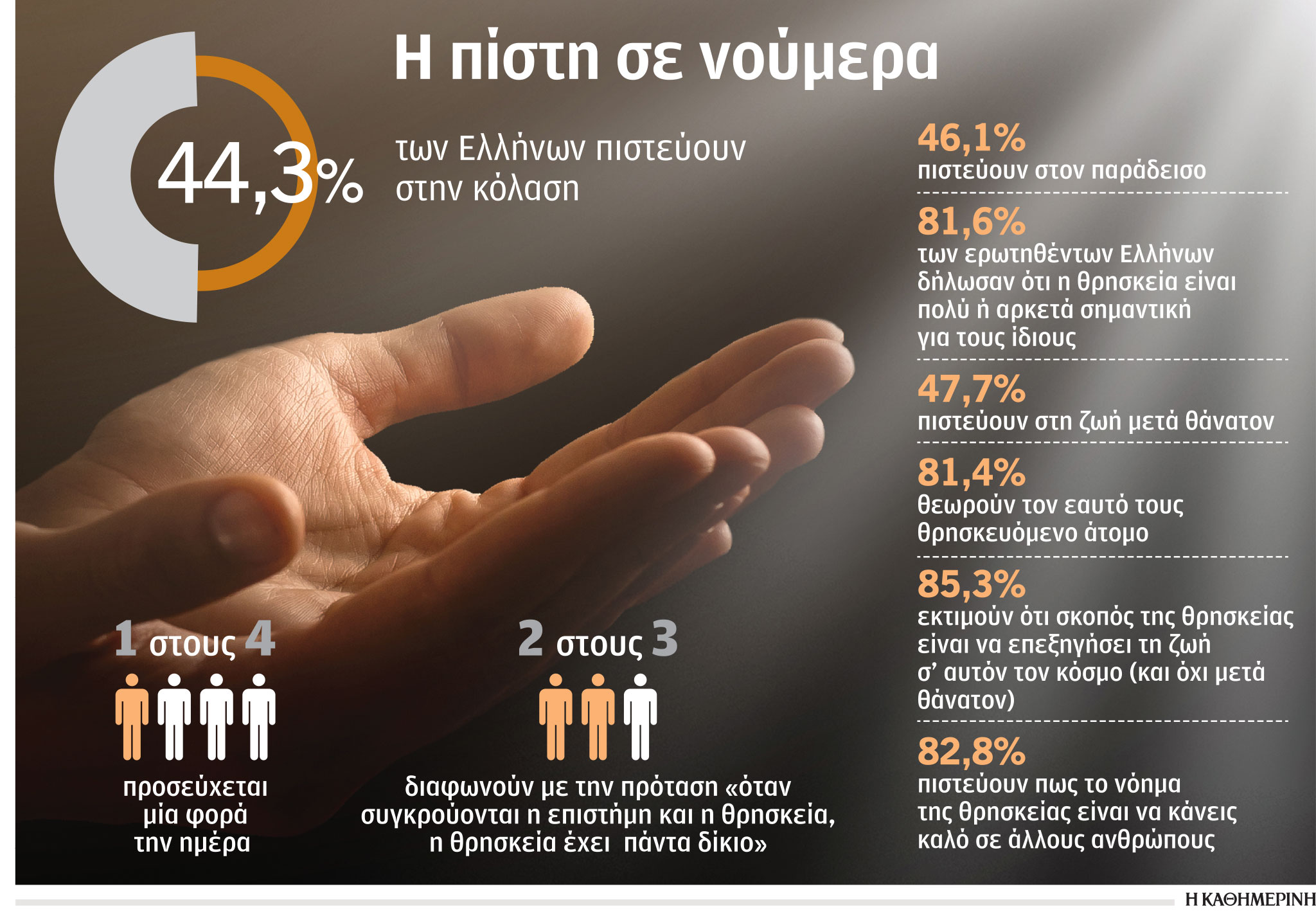
It is usually depicted as a dark, vast place where the only light comes from a flame constantly smoldering by sinful inhabitants who will be there for eternity and day. In The Divine Comedy, Dante imagined hell differently – he described it as a place of conical shape with different levels, or circles, which decrease in size as they approach the center of the Earth.
In your survey Overview of World Values they may not have specified how they imagine its form, but 44.3% of Greek respondents answered that they believe in the existence of hell. This particular survey, which began in 2017 and ended in 2021, is part of a global project that has been around since 1981. Although Greece participated for the first time, it was one of the first countries to receive data and answers to almost 300 questions. surveys were collected, many of which had to do with religion.
About 82% of Greek respondents said that religion is very or fairly important to them, with the corresponding percentage in Germany being 38.5%, in Japan 14.5% and in Morocco 98.6%.
As to whether they believe in God, 91.7% Greeks responded positively, with the percentage being the same or higher in countries such as Argentina (92.4%), Armenia (93.5%), Turkey (94.5%), Bolivia (97.4%) and Bangladesh (99.8%), among many others.
Lower performing countries included China, where 16.9% of respondents said they believed in God, the Netherlands (31.4%) and South Korea (40.6%).
It should be noted that the percentage of belief in God seems to have declined in Greece in the approximately five years since the survey was conducted in our country, in the fall of 2017, until today.
According to research work non-profit research organization communication What do the Greeks think? 78.7% of respondents in 2022 said they believe in God.
But even at the rates registered for Overview of World Values we see that, despite the fact that religion is very important for the vast majority, the beliefs of the respondents are not always fully consistent with the church, which may indicate a separation of the church from faith.

The World Values Survey was launched in 2017, completed in 2021, and included almost 300 questions.
For example, 66.4% stated that they disagreed with the statement that “when science and religion collide, religion is always right”.
In addition, almost 35% answered that they go to church only on holidays, if we exclude weddings, christenings and funerals.
In terms of beliefs 25.3% of respondents from Greece answered that abortion is never justified (as opposed to 47.6% in Cyprus, 54.8% in Turkey, 79.1% in Indonesia, and 18.7% in Germany, 11.4% in Australia and 8.6% in Canada), with a corresponding percentage regarding homosexuality in Greece 24.5% (68.2% in Turkey, 58.4% in Russia, 8.6% in Japan).
Outside hell46.1% of respondents from Greece answered that they believe in heaven, which is a percentage lower than in most other countries such as Australia (48.4%), Mexico (77.8%) and Turkey (91.2%) , and 47.7% said they believe in life after death.
But the survey was not only about faith and religion. Nearly 70% Greeks responded that they did not agree with the statement “men are better political leaders than women”, with the corresponding percentage in Nigeria being 24.1%, in Russia 38.5%, in Turkey 45% and in the USA 83.1% .
When asked before the war in Ukraine whether they would fight for their country in case of war, 69.6% of the Greeks answered in the affirmative (28.4% of the Dutch, 59.6% of the Americans, 76.4% of the Turks, etc.). Some questions also related to privacy.
It is significant that in the fall of 2017, about 80% of respondents from Greece did not agree with the proposal “the government has the right to collect information about anyone who lives in the country without knowing it.”
Value at work
Greeks, especially in relation to respondents from other countries, attach great importance to the value of work, according to a study of world values.
For example, 62.6% Greek participants agreed that work should always come first, even if it results in less free time.
The corresponding percentage in Australia was 21.3%, in Germany 28.6% and in Russia 34.8%, while in countries such as Lebanon (75.7%) and Jordan (87.3%) the picture was completely different.
In another question, survey participants asked participants to imagine a future world in which work would be less important in our lives. 60.6% of Filipino respondents said this would be a good development, as did 44.8% of German survey participants.
Not Greeks. Nearly 60% of Greek respondents said it would be bad if work became less important in the future, in line with the percentages of China (60.8%) and Argentina (60.2%).
Source: Kathimerini
James Springer is a renowned author and opinion writer, known for his bold and thought-provoking articles on a wide range of topics. He currently works as a writer at 247 news reel, where he uses his unique voice and sharp wit to offer fresh perspectives on current events. His articles are widely read and shared and has earned him a reputation as a talented and insightful writer.